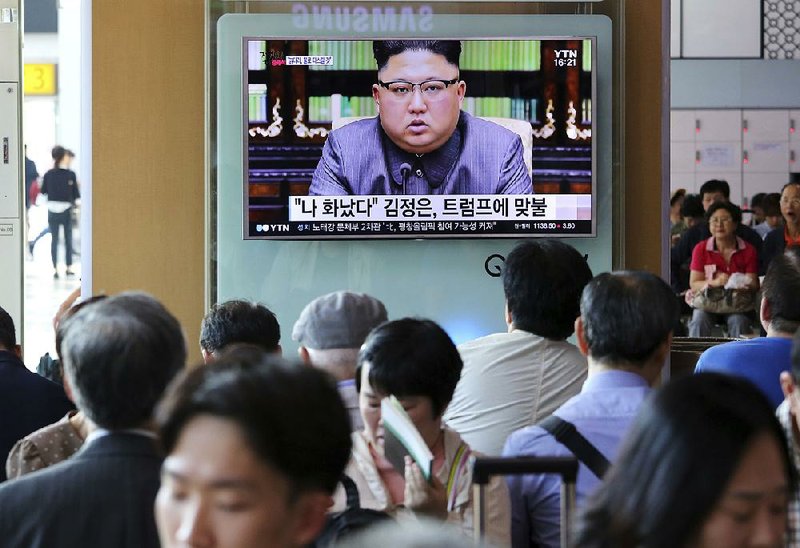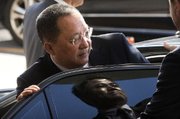NEW YORK -- President Donald Trump lashed back Friday at North Korea's leader, calling Kim Jong Un a "madman" whose regime will be "tested like never before" with the implementation of new U.S.-imposed financial sanctions.
Kim earlier Friday had called Trump a "mentally deranged U.S. dotard" and warned that he will "pay dearly" for his threat to "totally destroy" the North if it attacks.
In response, Trump tweeted that Kim is "obviously a madman who doesn't mind starving or killing his people."
The U.S. sanctions, announced Thursday, expanded the Treasury Department's ability to target anyone conducting significant trade in goods, services or technology with North Korea and to ban them from interacting with the U.S. financial system.
[PRESIDENT TRUMP: Timeline, appointments, executive orders + guide to actions in first 200 days]
The Trump administration has sought to build international support for more aggressively confronting the rogue nation, whose escalating nuclear and ballistic missile capabilities have reached what U.S. officials consider a crisis point. Analysts say the North is likely to soon achieve its objective of possessing nuclear missiles capable of reaching any part of the U.S. homeland.
Today, China, the North's main trading partner and energy supplier, announced that it will limit oil exports to North Korea under U.N. sanctions over its nuclear and missile development.
Trump repeatedly has called for China to use its position to increase pressure on North Korea. Beijing's status as the North's main trading partner makes its cooperation critical to the success of economic sanctions.
Kim said in his statement early Friday that if the U.S. were to carry out its threat to destroy the North, his country would consider the "highest level of hard-line countermeasure in history." His foreign minister, asked while in New York for the U.N. General Assembly what the countermeasure would be, said his country may test a hydrogen bomb in the Pacific Ocean.
"I think it could be the most powerful detonation of an H-bomb in the Pacific," Ri Yong Ho said, according to South Korean TV. "We have no idea about what actions could be taken as it will be ordered by leader Kim Jong Un."
A hydrogen bomb test in the Pacific, if realized, would be considered a major provocation by Washington and its allies. North Korea has conducted six nuclear test explosions since 2006, all at its northeastern underground test site.
Susan Thornton, acting assistant secretary of state for East Asia and the Pacific, told reporters that such a weapons test would be "outrageous" and would draw a "concerted and determined international response."
Thornton declined, however, to specify what the U.S. would do. Secretary of State Rex Tillerson, who said Friday that Kim is "being tested" by the strongest sanctions ever put in place by the U.S. and the international community, also declined to describe a U.S. response.
North Korea says it needs nuclear weapons to deter a U.S. invasion, but Thornton contended that the North ultimately seeks to take over U.S.-allied South Korea.
She said Kim's goal in developing nuclear weapons is "to fulfill a long-term desire on the part of the North Korean regime to reunify the Korean Peninsula under the Kim family regime and proliferate these weapons and blackmail other countries."
Japanese Defense Minister Itsunori Onodera noted that a Pacific test could mean a nuclear-armed missile flying over Japan. He said North Korea might conduct a hydrogen bomb test with a medium-range or intercontinental ballistic missile, given its recent advances in missile and nuclear weapons development.
"We cannot deny the possibility it may fly over our country," he said.
It has been 37 years since any nation tested a nuclear weapon in the planet's atmosphere, reflecting the nearly universal opposition to such tests over fears of the effects of radioactive fallout on human health and the environment. The last atmospheric test took place in 1980, when China fired what experts believed to be a nuclear-tipped ballistic missile into a desert salt flat more than 1,300 miles west of Beijing.
Shin Beom-chul, a security expert at the government-run Korea National Diplomatic Academy in Seoul, said that even if North Korea wanted to conduct an atmospheric nuclear test in the Pacific, it did not have the ability to dispatch test-monitoring ships to the open ocean while the U.S. military was on the prowl.
Shin said North Korea probably would not risk the radioactive fallout and other dangers involved in a nuclear missile test. The country has yet to master the technologies needed to prevent the warhead at the tip of its long-range ballistic missile from burning up while re-entering Earth's atmosphere, South Korean officials said.
Rep. Duncan Hunter, R-Calif., said earlier in the week that the United States needs to launch a pre-emptive strike against North Korea in order to prevent the rogue nation from harming the U.S. first.
"You could assume, right now, that we have a nuclear missile aimed at the United States, and here in San Diego. Why would they not aim here, at Hawaii, Guam, our major naval bases?" Hunter, a member of the House Armed Services Committee, said Thursday on San Diego's KUSI-TV.
"The question is, do you wait for one of those? Or, two? Do you pre-emptively strike them? And that's what the president has to wrestle with. I would pre-emptively strike them. You could call it declaring war, call it whatever you want," Hunter continued.
North Korea was slapped with stiffer sanctions by the United Nations after its sixth and most powerful nuclear test Sept. 3. In recent months, it also has launched a pair of still-developmental intercontinental ballistic missiles it said were capable of striking the continental United States and two intermediate-range missiles that soared over Japanese territory.
Under the sanctions China's Commerce Ministry announced today, exports of refined petroleum to the North will be limited to 2 million barrels per year and sales of liquefied natural gas banned outright, effective Jan. 1. The current size of Chinese energy supplies to the North and how much that would be reduced were unclear.
Chinese leaders were long the North's diplomatic protectors but have expressed increasing frustration with Kim's government.
They have supported the latest rounds of U.N. Security Council sanctions but are reluctant to push Pyongyang too hard for fear the government might collapse. They also have argued against doing anything that might hurt ordinary North Koreans.
On Friday, China's Foreign Ministry spokesman pushed back on Trump's suggestion a day earlier that Beijing had gone so far as to order banks to cease conducting business with North Korean entities.
Trump, praising President Xi Jinping, called the move "very bold" and "somewhat unexpected."
"As far as I know, what you have mentioned just now is not consistent with the facts," spokesman Lu Kang said at a regular news conference.
Experts said Chinese banks had been told not to let North Korean individuals or companies open new accounts.
In the U.N. General Assembly speech to which Kim responded Friday, Trump mocked Kim as "rocket man" on a "suicide mission" and said that if "forced to defend itself or its allies, we will have no choice but to totally destroy North Korea."
Kim said Trump's remarks "have convinced me, rather than frightening or stopping me, that the path I chose is correct and that it is the one I have to follow to the last."
Information for this article was contributed by David Nakamura, Anne Gearan, Anna Fifield, Brian Murphy, Abby Phillip, Peter Whoriskey, Simon Denyer, Shirley Feng, Luna Lin and Liu Yang of The Washington Post; by Foster Klug, Matthew Pennington, Robert Burns, Kim Tong-hyung, Hyung-jin Kim, Joe McDonald and other staff members of The Associated Press; by Joshua Stewart of The San Diego Union-Tribune; and by Choe Sang-Hun of The New York Times.
A Section on 09/23/2017


